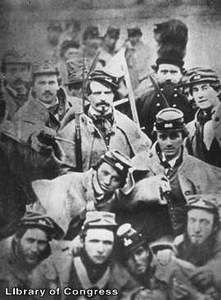 Union forces, advancing ever southward, are pressuring Texas, intent on occupying a portion of the southwestern state. Today Union naval forces move up the Sabine River in a second attempt (the first being the prior year) of trying to gain control of the waterway at Sabine Pass. Today the offensive meets stiff resistance from Confederate forces who easily route the federals, forcing a Union retreat. The United States loses two gunboats and some 200 causalities (men killed, captured or wounded). On the other side, the Confederates suffer no loses and no casualties. The battle is the most lopsided Confederate victory to date, a victory much-needed at a time of low Southern morale. Yet the effect upon the war itself is negligible at best, as Texas is on the periphery of the great conflict and the Union naval blockade of the Texas coast remains in place.
Union forces, advancing ever southward, are pressuring Texas, intent on occupying a portion of the southwestern state. Today Union naval forces move up the Sabine River in a second attempt (the first being the prior year) of trying to gain control of the waterway at Sabine Pass. Today the offensive meets stiff resistance from Confederate forces who easily route the federals, forcing a Union retreat. The United States loses two gunboats and some 200 causalities (men killed, captured or wounded). On the other side, the Confederates suffer no loses and no casualties. The battle is the most lopsided Confederate victory to date, a victory much-needed at a time of low Southern morale. Yet the effect upon the war itself is negligible at best, as Texas is on the periphery of the great conflict and the Union naval blockade of the Texas coast remains in place.
Meanwhile, Southern Baptist newspaper editors continue imploring their fellow Baptists to remain hopeful despite the major battlefield losses at Gettysburg and Vicksburg two months earlier. One editorial this week offers assurance that Confederate soldiers are in good spirits, countering reports of growing discouragement and desertions.
“I hear a great deal more discouraging talk out of the army than I do in it.”
Such was the remark made by a young soldier on the cars.
It is most encouraging to the timid and fearful to know that our soldiers are in the best spirits as to the issue of this war.
An excellent remedy for low spirits is a visit to the army. There you will see the men who bear the heat and burthen of this strife cheerful, hopeful, and quitting themselves like men. Especially is this so in the army of Gen. Lee; and so far as we can learn in every other department.
We like to hear this brave talk of the gallant men who follow the war path. If the people at home will only do their part of the work as faithfully as the soldiers are doing theirs, we shall soon, under the blessing of God, see the dark clouds began to break, and the dawn of peace gild the sky. There is no good reason for the despondency. Our reverses are not ruinous. They are what must be looked for in a war of such magnitude. And if rightly received, they will be among the most powerful agencies for good to the nation. Trials bring out what is true and noble, and great in man; they have the same effect on nations. A summer sea, with its soft breezes and deep calm swell, does not make a sailor, he must be trained and hardened–made skillful by all the hardships of ocean life. As a nation, we would be unfitted for the place that providence designs us to fill, if we should reach it without enduring hardness as good soldiers. Privileges most dearly bought are most highly prized, and most sternly defended.
What we shall gain by this war will be blood-bought; and so sacred will be these treasures, that the people of the confederacy must ever cherish and defend them next to their religion.
Every man, now not fit to be a slave, must place a proper estimate on these rights and blessings for which we contend; and must ask, in all the fervor of his patriotism give me a place where I can aid in achieving the independence of this land. And, having found his place, he must stay there and labor, and suffer, and be hopeful, and wait for the deliverance that a just God will bring to a Christian people struggling to be free.
Be hopeful, reader; your gloomy face, and more gloomy talk will do harm–much harm to our cause.
Be cheerful; talk cheerfully to your friends, write cheerful letters to them whether in the army or out of it, and you will contribute to the success of our arms. We need fortitude as much as indeed more than we need courage. We must learn to bear trials as well as to win victories. Be hopeful.
Whether or not forced cheerfulness will truly aid the Southern cause is yet to be determined.
Sources: Second Battle of Sabine Pass (link) and (link); “Be Hopeful,” Biblical Recorder, September 9, 1863 (link)


